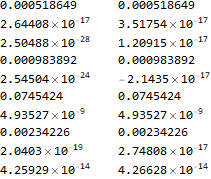I need to work out the probability of having $k$ successful trials out of a total of $n$ when success probabilities are heterogeneous. This calculation relates to the Poisson Binomial Distribution. Does Mathematica, or perhaps the Mathstatica add-on, have an implementation for that?
4 Answers
Mathematica does not know about the PoissonBinomialDistribution, but you can use the formula given for the PDF on Wikipedia:
PoissonBinomialDistribution[ plist : { __?NumericQ } ] := With[
{
n = Length @ plist,
c = Exp[(2 I \[Pi])/(Length@plist + 1)]
}
,
ProbabilityDistribution[
Re[ 1/(n + 1) Sum[c^(-l k) Product[1 + (c^l - 1) plist[[m]] , {m, 1, n }], {l, 0, n}] ]
,
{k, 0, n, 1}
]
] /; AllTrue[ plist, 0 <= # <= 1& ]
Now we may model a quality control where fault type 1 has a prob of 4% and fault types 2 and 3 have a prob of 7%:
dist = PoissonBinomialDistribution[ {0.04, 0.07, 0.07} ];
With this we find the probability for 3 faults:
Probability[ k == 3, k \[Distributed] dist ]// PercentForm
0.0196 %
Update
Another possibility is to work with TransformedDistribution. Doing so also allows for symbolic evaluation:
PoissonBinomialDistribution::fargs = "Probabilities must be between zero and one";
PoissonBinomialDistribution[ plist : {__?NumericQ | __Symbol } ] := With[
{
xList = Table[ Unique["x"], Length @ plist ]
}
,
If[ Not @ AllTrue[ plist, 0 <= # <= 1 &],
Return[ Message[PoissonBinomialDistribution::fargs]; $Failed ]
];
TransformedDistribution[
Total @ xList,
Thread[ xList \[Distributed] Map[ BernoulliDistribution, plist] ]
]
]
PDF[ PoissonBinomialDistribution[{p1, p2, p3}], x ]
-
$\begingroup$ This produces wildly incorrect results pretty quickly... $\endgroup$– ciaoCommented Apr 25, 2019 at 5:59
-
$\begingroup$ @ciao Will the
TransformedDistributionsolution I just added also produce incorrect results? $\endgroup$– gwrCommented Apr 25, 2019 at 6:02 -
$\begingroup$ The latter s/b fine, but will get very slow with more than a couple dozen probabilities. $\endgroup$– ciaoCommented Apr 25, 2019 at 6:38
-
$\begingroup$ @ciao Indeed, I just tested with a bunch of random numbers: Already with about 15 probs it takes "hours". :-( $\endgroup$– gwrCommented Apr 25, 2019 at 6:41
-
2$\begingroup$ As I explained here this solution is quite inadequate. There are much better approaches. $\endgroup$ Commented Aug 12, 2019 at 11:08
From what it appears you require, the following should suffice:
pb = Fold[ListConvolve[##, {1, -1}, 0] &, Transpose[{1 - #, #}]] &;
It should provide more accurate results for reasonably sized probability vectors.
As an example, a vector of 100 probabilities:
SeedRandom@1234
testps = RandomReal[{0, 1}, 100];
Timings:
r1 = pb@testps; // AbsoluteTiming // First
r2 = Re@PDF[PoissonBinomialDistribution[testps], Range[0, Length@testps]]; // AbsoluteTiming // First
0.0008377
0.137304
Comparing accuracy with a random sample of the PMFs (pb left, PoissonBinomialDistribution right. The correctness of pb was verified for full PMF):
With[{p = RandomSample[Range@100, 10]},
Transpose[{r1[[p]], r2[[p]]}]] // TableForm
You can of course use the same to generate generic results for n probabilities, à la Carl Woll's answer, and then replace probabilities as desired:
np = 18;
r1 = Table[p[np, x], {x, 0, np}]; // AbsoluteTiming // First
r2 = pb[Array[p, np]]; // AbsoluteTiming // First
%%/% // Round
And @@ MapThread[FullSimplify[#1 == #2] &, {r1, r2}]
504.622
0.0738808
6830
True
Same results, but ~1/7000th the time taken. I tried with np of 20, gave up waiting, probably 1/20000th the time or so...
-
$\begingroup$ (+1) Very nice. If one uses machine precision numbers and adds
ChopandRefor the Fourier-Transform-Solution the timing can at least be brought down to around 0.034 secs on my machine (which is of course still way off this solution). $\endgroup$– gwrCommented Apr 25, 2019 at 10:22 -
$\begingroup$ Even faster should be
Thresholdinstead ofChop... $\endgroup$ Commented Apr 29, 2019 at 20:15
Another possibility is:
p[n_, k_] := SeriesCoefficient[Product[1 - (1 - ϵ) p[i], {i, n}], {ϵ, 0, k}]
Reproducing gwr's results:
Table[p[3, i], {i, 0, 3}] //Simplify //Column //TeXForm
$\begin{array}{l} -(p(1)-1) (p(2)-1) (p(3)-1) \\ -2 p(3) p(2)+p(2)+p(3)+p(1) (-2 p(3)+p(2) (3 p(3)-2)+1) \\ p(2) p(3)+p(1) (-3 p(3) p(2)+p(2)+p(3)) \\ p(1) p(2) p(3) \\ \end{array}$
I have answered this question using a full implementation of the Poisson Binomial.


